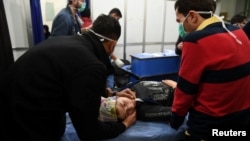The global chemical weapons watchdog is considering sending inspectors to investigate an alleged poison gas attack by rebels in Syria that wounded dozens, its director-general said Monday.
Syria's state-run SANA news agency said the suspected chemical attack late Saturday was carried out by "terrorist groups positioned in Aleppo countryside" that fired shells containing toxic gases on three neighborhoods in Syria's largest city.
Syria has asked the Organization for the Prohibition of Chemical Weapons to launch an investigation and officials at the Hague-based watchdog have been in touch with U.N. experts "to assess the security situation on the ground for a possible deployment" of a fact-finding mission, Director-General Fernando Arias told a meeting of the organization's member states in The Hague.
Arias said that different sources put the number of wounded at between 50 and 100.
The OPCW's fact-finding mission is tasked with investigating alleged chemical attacks in Syria and reporting back to the organization and the United Nations.
It has probed several attacks in Syria blamed on both government forces and rebels. The OPCW also has recently been empowered — against the wishes of Syria and its ally Russia — to apportion blame for chemical attacks.
"The OPCW experts will continue to work independently to verify all allegations of use of chemicals as weapons in the territory of the Syrian Arab Republic," Arias said.
Following the alleged attack, Russian warplanes attacked rebel-held areas in northern Syria for the first time in weeks on Sunday.
The rebels, who deny carrying out any poison gas attacks, accused the government of trying to undermine a truce reached by Russia and Turkey in September.
Russian military spokesman Maj. Gen. Igor Konashenkov said Sunday that Russian warplanes destroyed militant positions in northern Syria linked to the alleged gas attack.
The announcement in the Hague came shortly before President Bashar Assad reshuffled his Cabinet, replacing nine officials including the minister in charge of internal security. Cabinet reshuffles like the one announced Monday are not uncommon in Syria and have occurred on several occasions since the civil war began seven years ago.
It was not immediately why Assad replaced longtime Interior Minister Mohammed Ibrahim al-Shaar, who was wounded in a 2012 bombing that killed four top security officials. Al-Shaar was replaced by Maj. Gen. Mohammed Khaled Rahmoun, who headed the powerful Political Security Directorate, one of the main intelligence agencies in the country.
The U.S. Department of Treasury imposed sanctions on Rahmoun, 61, last year.
Other ministers changed include those of tourism, education, public works, telecommunications and industry.
In eastern Syria, meanwhile, four days of fighting between U.S.-backed forces and Islamic State militants have left scores dead on both sides, opposition activists said.
The latest round of fighting broke out Friday when IS took advantage of fog to launch an offensive from the last area they control in Syria. The Britain-based Syrian Observatory for Human Rights said 92 members of the Kurdish-led Syrian Democratic Forces and 61 militants have been killed since.
Omar Abou Leila, who monitors the war in Deir el-Zour from Europe, said Monday that dozens of SDF fighters were killed.
SDF fighters launched an offensive on Sept. 10 under the cover of airstrikes by the U.S.-led coalition to liberate the last pocket held by IS near the Iraqi border. They have made little progress since then.




